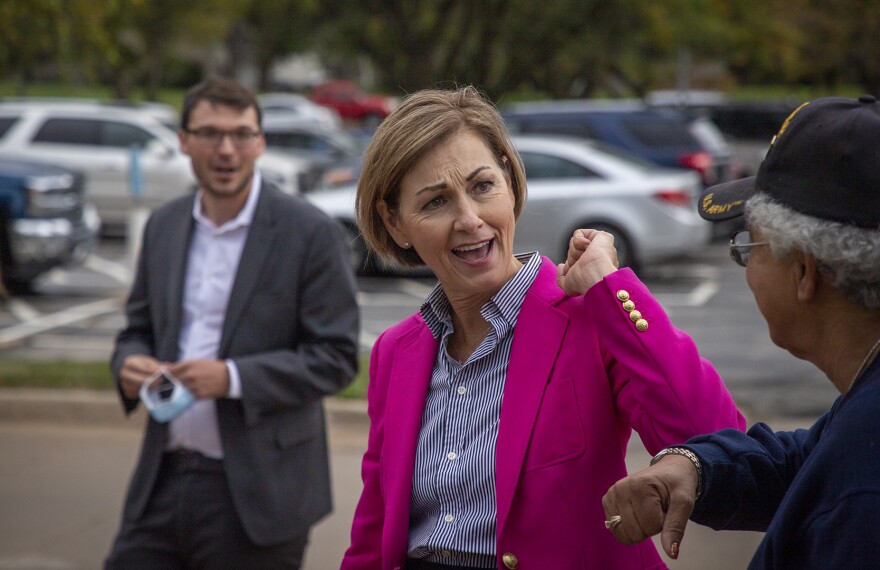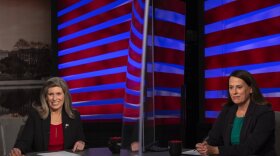The coronavirus pandemic has changed the way campaigning looks in Iowa this election year as campaigns look at how to balance public health recommendations with the need to get out and connect to voters. Democrats have made more changes to how they’re approaching campaigning in these times of COVID-19 than Republicans. In fact, Vice President Mike Pence will make another campaign appearance in the state Thursday.
Republican Gov. Kim Reynolds stopped by the parking lot of Iowa PBS in Johnston on Monday night ahead of the Senate debate between Sen. Joni Ernst and her Democratic challenger Theresa Greenfield.
“You’re out here in the rain, you’re working the streets, you’re making the calls, you’re talking to volunteers,” Reynolds said to a group of Ernst supporters. “It makes a difference!”
Reynolds told reporters that politicians can still meet with voters while taking proper health precautions and Greenfield isn’t getting out enough.
“[Meeting with voters] is an important part of the process and it always has been,” Reynolds said. “The virus isn’t going away until we have a vaccine.”
Ernst’s campaign regularly boasts her tour of Iowa’s 99 counties and she brought it up at that debate.
“I have just completed my sixth consecutive year of the 99 county tour,” Ernst said during the Monday night debate. “[It’s] Very important to get out and speak to Iowans. My opponent has not been out to probably 40 or so counties.”
Meanwhile, Greenfield is still holding campaign events.
“We’ve done over 250 campaign events and we’re going to keep traveling the state,” Greenfield told reporters at a press conference on Tuesday. “Much of them have been in-person but many of them have been virtual.”
However, video conferencing calls are a poor substitute for meeting voters in-person, said Drake University Political Science Professor Dennis Goldford. Goldford says study after study has shown it’s personal contact that is more likely to make a difference for a voter.
“To the extent that Democrats are trying to encourage people that didn’t vote before to turn out or even encourage people who did vote to turn out,” Goldford said. “If they are not having some sort of personal contact, they’re fighting with one hand tied behind their back.”
But there have been photos of GOP campaign events popping up on social media that would suggest it’s business as usual on the campaign trail. A fundraiser in Pottawattamie County featuring Sen. Ernst and South Dakota Gov. Kristi Noem showed a packed room where guests were eating.
Great to be in Pottawattamie County Iowa tonight to talk about the success of @realdonaldtrump. Completely packed crowd. Iowa will deliver again for Trump-Pence! Four More Years. pic.twitter.com/Cnnp7xLPIM
— Corey R. Lewandowski (@CLewandowski_) September 5, 2020
Dr. Jorge Salinas is a hospital epidemiologist at the University of Iowa Hospitals and Clinics. He says whether indoor activities can occur depends largely on a community’s COVID-19 positivity rate.
“Iowa has been above 10 percent for a long while now,” Dr. Salinas said. “Then I would encourage people to not gather in groups larger than 10 or 20.”
Dr. Salinas said the preference would be for outdoor gathering and people would need to wear face coverings and maintain social distancing. He also says traditional door-to-door campaigning can still take place as long as volunteers wear face covering and maintain social distancing.
President Trump’s campaign says nationwide it knocks on a million doors a week. Joe Biden’s campaign has not hit the streets like that for months.
However, the coronavirus does not see Republican or Democrat.
“Public health and science are not rooting for any candidate in particular,” Dr. Salinas said.
Meanwhile, Iowa Secretary of State Paul Pate expects a surge of absentee voting for this election as Iowa continues to have one of the highest rates of new COVID-19 cases in the country.








